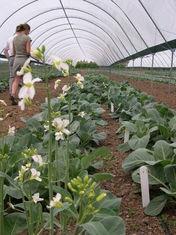
UK research organisations could be prepared to take on Warwick HRI’s Kirton research centre, which will be closed in spring 2009, avoiding the total loss of the 120-acre site to the domestic vegetable industry.
The University of Warwick announced the planned closure of its Kirton site, in Lincolnshire, which is losing £280,000 a year under the Warwick HRI banner.
But counterparts in the research field, including Stockbridge Technology Centre (STC) and the Horticultural Development Company (HDC), have already expressed an interest in taking the site on under the right circumstances.
Graham Ward, a director of STC, told FPJ: “Stockbridge would be interested in adding the technology transfer and applied research of Kirton to its business. But we certainly would not want to add a loss of £280,000 a year. A rescue mission for the status quo is not an option. We are in discussions on what the future business for the site might be; it is a valuable site.”
Neil Bragg, chairman of the levy-funded HDC, is also in the hunt: “We have already started talks with various parties in the Kirton vicinity with regard to possible future uses of the site and employment of levy-payers’ funds,” he said. “The outcome of these discussions should become apparent by mid-September.
“What is certain, is that there simply are not enough basic, strategic and applied funds to maintain the existing facilities that have traditionally engaged in horticultural R&D while, at the same time, also fund new work in new areas to underpin the industry.”
Professor Simon Bright, director of Warwick HRI, said that a loss of more than £1 million in four years made the decision sadly inevitable. “Any operation, whether it be a business, university or government one, has to be a going concern,” Bright told FPJ.
“The university has supported Kirton. The industry has had nearly five years of research and knowledge transfer; hopefully now there could be a reconfiguration and the industry could play a bigger role.”
Ward also warned that any research group that takes on the operation of Kirton would be relying heavily on growers and the industry at large to actively support the move. “If growers are not prepared to back it and prefer to go down the route of internalisation of research within their own businesses, then it will have no future,” he said.



